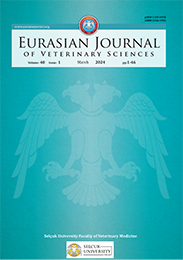| 2020, Cilt 36, Sayı 2, Sayfa(lar) 102-106 |
| [ Türkçe Özet ] [ PDF ] [ Benzer Makaleler ] |
| Investigation of seroprevalence of maedi-visna disease in sheep flocks in Afyonkarahisar province |
| Ömer Barış İnce |
| Pamukkale University Animal Breeding and Genetic Research and Implementation Center, Kınıklı Campus, Denizli, Turkey |
| Keywords: ELISA, Maedi-Visna, risk factors, seroprevalence, sheep |
| Downloaded:573 - Viewed: 1827 |
|
Aim: In this study, it was aimed to determine the presence of Maedi-Visna Virus
(MVV) infection in sheep in Afyonkarahisar province serologically and to
analyze the risk factors associated with MVV infection in the region.
Materials and Methods: For this purpose, 248 serum samples were randomly collected from 22 sheep flocks considering the epidemiological sample size from the region between May 2016 and April 2018. Collected samples were tested with the ELISA kit for MVV specific antibodies. Potential MVV risk factors were evaluated statistically by univariate logistic regression analysis. Results: The seropositivity in the ensampled animals was found to be 5.65% (14/248), and it was 13.63% on the basis of flock (3/22). Seropositivity was determined to be 3.94% and 13.33% in males and females, respectively. On the basis of animals, there was a statistically significant relationship between the presence of goat in the flock and gender and seropositivity of the disease infection (p <0.05). Conclusion: Flocks in which sheep with persistent MV infection with a viral disease which is characterized by slow progress followed by a gradual increase in severity and results in death leading to economic losses in the sheep sector are detected, should be monitored periodically for viral factors leading to economic losses. Considering the results of this study, it is thought that analyzing epidemiology of MV infection in flocks through regular monitoring and developing strategies for controlling it would be useful. |
| [ Türkçe Özet ] [ PDF ] [ Benzer Makaleler ] |




